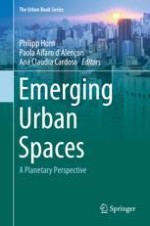2018 | OriginalPaper | Buchkapitel
10. Urbanisation, Sustainability and Development: Contemporary Complexities and Diversities in the Production of Urban Space
verfasst von : Roberto Luís Monte-Mór
Erschienen in: Emerging Urban Spaces
Aktivieren Sie unsere intelligente Suche, um passende Fachinhalte oder Patente zu finden.
Wählen Sie Textabschnitte aus um mit Künstlicher Intelligenz passenden Patente zu finden. powered by
Markieren Sie Textabschnitte, um KI-gestützt weitere passende Inhalte zu finden. powered by
